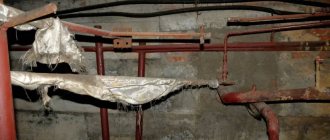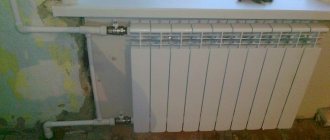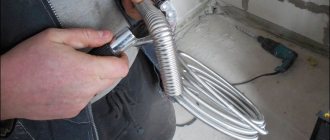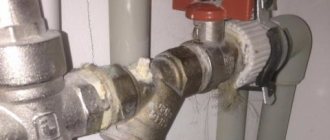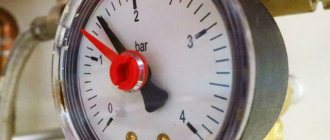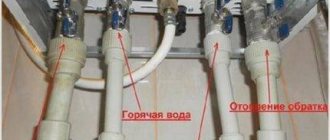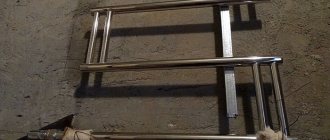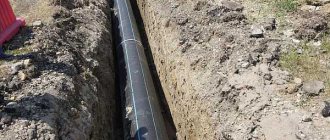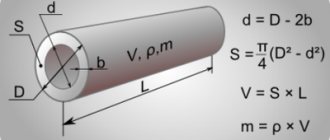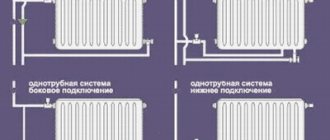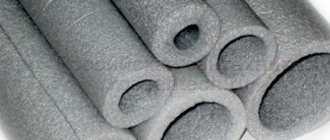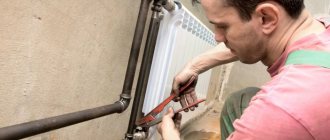Anyone who has water heating in their house or apartment has encountered the phenomenon of noise in pipes. Let's look at it in more detail, because this is a sign of improper operation of the system, incorrectly selected instruments and devices according to the technical characteristics, or an incorrectly assembled pipeline diagram.
Long-term practice of operating heating systems assembled on pipes made of different materials has shown that heating pipes made of steel or cast iron make the most noise and the loudest. But metal-plastic or PVC pipelines can also generate noise in the heating system of the following order: bubbling in the boiler or in pipes, gurgling, clicks and knocks, crackling and rattling, whistling. Each such sound indicates a specific breakdown or cause of the noise. But in addition to identifying the cause of noise, we can find out what to do to eliminate this or that noise.
Let us list the main reasons why the heating pipes of a private house or apartment in a high-rise building hum:
- Airing in the heating system;
- Loud noise in heating pipes can appear due to the high speed of movement of the working fluid, which can happen if the diameter of the pipes is chosen incorrectly, and also due to the fact that metal pipes become covered with lime and mineral deposits on the inside over time;
- If water gurgles, this means that the coolant is leaking through a crack in the pipe, through an open valve, or through a poorly sealed threaded connection;
- There may be the following reasons: rust or scale has peeled off and clogged the pipe, so the pipeline gurgles;
- Incorrect installation of shut-off valves and other equipment;
- If you turn on the circulation pump and there is noise, hum or hum, the reason for this may be that the pump power is too high;
- Depreciation (wear) of fittings or thermostats;
- Also, water in the heating system of a private house can make noise due to the fact that the steam in the superheated coolant flowing from a pipe of a smaller diameter to a pipe of a larger diameter and vice versa collapses loudly and makes noise from the heating system.
What types of noise can pipelines make?
The sounds emanating from heating system elements are legendary. Under certain circumstances, not only heating pipes make noise in the house, but also other pipelines. At the same time, the sound range of all sanitary systems is approximately the same. The most “musical” ones are metal pipes, but they also play unusual melodies. A water heating system can make a wide variety of sounds:
- murmur;
- gurgling;
- rattling;
- knock;
- crack;
- clicks;
- hum;
- whistling;
- howl.
Specific sounds signal the presence of problems in the heating system, so it is necessary to quickly identify and eliminate the source of the noise, since systematic exposure to it leads to disorders of the nervous system, interferes with sleep and reduces performance. Why is water noisy in heating pipes * Noise in heating pipes is caused by the following reasons:
- air jams;
- high speed of coolant movement due to incorrectly selected pipeline diameter or a decrease in the internal lumen of the pipe due to overgrowing of its walls;
- coolant leakage in emergency areas or through poorly closed valves;
- scale peeled off from the pipe walls or debris that got into the circuit during installation;
- faulty or incorrectly installed valves;
- excessive pump power or improper installation;
- wear of control valves or thermostatic heads;
- cavitation - the formation of steam bubbles in the coolant in the area of a sharp increase in the diameter of the pipeline (the appearance of an area of low pressure) with their subsequent collapse, destroying the equipment;
- violations of installation technology (use of polypropylene pipes with a diameter smaller than the calculated one, failure to observe the minimum distance between parallel sections of a metal pipeline during installation, installation of a filter or valve not in the flow direction indicated on it, etc.).
Important! The central heating always turns on noisily. When the system is filling, you can hear the murmur of the coolant, the heating of the circuit is accompanied by clicking sounds, and the air coming out of it is accompanied by a whistle. Maintenance of heating equipment before start-up can also be carried out using impact. Such noises usually disappear once the system is operational and are not a cause for concern.
*
If extraneous sounds appeared at the height of the heating season or did not disappear after the start-up took place, then this is a signal of the presence of malfunctions, and you should look for malfunctions not only in yourself or your neighbors in the riser, but also in the heating point or elevator unit - the source of the trouble may be far away outside the home, since sound waves travel well through pipes.
Methods for neutralizing noise
The source of noise often turns out to be in the locations of public utilities. The coolant pressure at the heating main entry point is the highest, so the slightest malfunction in it can immediately manifest itself in the form of strange sounds throughout the entire entrance. In a private house, the noisiest place is the furnace or heat generator room, where the boiler and its entire piping system are located.
Note: Aluminum and bimetallic radiators are especially sensitive to pressure changes. Thin metal transmits any vibrations through itself, like a megaphone. In such heating devices, the slightest technological noise acquires an amplified sound.
If the problem turns out to be a malfunction of collectively owned equipment, then you should not fix it yourself. Worn-out components can literally crumble at the slightest attempt to unwind them, and all the blame will be placed on the one who unauthorizedly interfered with the operation of the “perfectly debugged” system. It is better to send a complaint to the service organization and patiently wait for their representative to repair the faulty components.
A visual reminder with the coordinates of addressees if it is necessary to contact housing and communal services issues
*
If you were able to diagnose problems within your own or a neighbor’s home, then you should begin to eliminate them as quickly as possible. In this case, any delay is fraught with aggravation of the situation and complication of repair work.
conclusions
All of the noises listed above and how to prevent and eliminate them are aimed at optimizing the problem if pipes or heating equipment begin to make noise. The first important step in solving the problem is identifying the location of the source of the extraneous sound. The second step is to assess the scope of work and the required amount of materials. The third stage is assessing the possibility of self-repair or eliminating noise in other ways, or determining the need to call specialists. A situation may also arise in which the noise can last until the end of the heating season, which will make it easier to eliminate them when the boiler is turned off.
In a high-rise building, such issues should be resolved by the utility service, but it is better to monitor their work. By identifying the source of noise in the pipeline in a timely manner, you will save not only money and expensive equipment, but also your health.
Humming, howling
The loudest and most unpleasant type of noise. Pipes can start buzzing out of the blue and give rise to poltergeist stories. However, mysticism has nothing to do with it, and communication with spirits will not save you from noise in the pipes.
When a hum occurs, you need to look for a coolant leak. First of all, a thorough inspection of your home is carried out, then all neighboring apartments. If everything is dry, then the search continues in the basement. A cloud of steam, a puddle or a whistle will help you easily determine the place where the water is leaking. In apartment buildings, repairs will be carried out by the management company, in private houses - by the owner of the property. After inspecting the problem area, a decision is made on how to eliminate the malfunction - by repairing or replacing the unit; sometimes it is enough to simply tighten a poorly closed valve.
Another reason for the hum may be the use of pipes in the heating system with a diameter smaller than the calculated one. In this case, the problem area is determined by ear, and the required section of the pipeline is replaced with material with greater permeability. With the correct selection of pipes and high-quality performance, you will no longer have to listen to the pipes hum.
Distribution unit of a central heating system in the basement of an old apartment building
Methods for finding a faulty tap
To identify an apartment with faulty taps, you need to turn them off one by one from the hot and cold water pipes and listen to whether the unpleasant sound has disappeared or not. As soon as the hum in the pipes stopped, an apartment with faulty plumbing was found.
If you checked each of the apartments in the house using the method described above, and the problem was not solved, it is likely that the sound is caused by the installation of a valve blocking the riser. You can test this hypothesis by turning off the taps supplying water to this riser. If the sound disappears, then the problem lies with the riser valve.
Remember also that if you have a branched water supply system in your basement, containing many valves and valves, any shut-off valves can cause a hum. In this case, determining the cause of unpleasant sounds without an experienced plumber can be very difficult and not as quickly as we would like.
If the cause was still localized, consider yourself lucky. With simple repairs it can be easily eliminated.
Bubbling, crackling and clicking
Particles of debris, sludge or exfoliated scale, when moving through the pipes, hit the walls and rub against them, creating noise in the form of crackling or seething. A characteristic sound when clogged is also a clicking sound. To eliminate this type of noise, it is necessary to flush the system.
Foreign objects in the pipes will click until they come out. Therefore, all liquid is drained from the system through the drain valve. Using a hose, the old coolant with debris is directed into the sewer, the system is additionally washed with water (steel pipes are tapped on the outside with a wooden mallet to remove scale from the inside from the walls), after which the heating circuit is refilled.
Important! Before draining dirty water, it is better to dismantle the drain valve to allow large pieces of debris to come out and not clog the shut-off device.
*
Quite often, pipes crack and click due to a malfunction of the valve or its installation in the wrong direction of flow. The curved passage hole easily becomes clogged, and over time a plug may form in it, completely blocking the movement of the coolant. Partial blocking of the pipe lumen with debris creates noise when water passes through. If the valve is positioned the other way around, then liquid enters it not from the bottom side of the locking disc, but from above, which leads to destruction of the stem and separation of the valve. In this case, the movement of the coolant will also be accompanied by noise.
The most rational way out of the situation is to replace the valve, since it is already partially worn out in the wrong position and is therefore unpredictable after reinstallation. In the absence of a new unit, you can temporarily install the old one by replacing the sealing material of the threaded connections.
Advice: When choosing new shut-off and control valves, you need to keep in mind that ball (plug) valves are much more practical to use, can be installed in any direction and are not as sensitive to blockages as screw valves.
If you close the ball valve tightly, it can also become a source of noise. This is not a malfunction and can be corrected by opening it slightly or closing it completely. Valves with thermostatic heads can also make noise if the temperature set on them is close to the actual temperature in the room. In this case, the entrance to the radiator is not completely blocked, and the coolant passes through a small hole with a characteristic sound. To get rid of the noise, simply turn the head towards the sprocket.
Troubleshooting Methods
In a centralized heating system, only employees of the operating company can eliminate the problem of hum in the riser. You can submit an application by writing an application and submitting it to representatives of the service company.
Having identified errors made during installation, the technicians will be able to localize the cause and eliminate the defects, but for an additional fee.
You can try to localize the cause of the appearance of characteristic sounds yourself. To do this, follow this technique:
- Observe the frequency of sound occurrence.
- Try to determine the dependence (pressure surges in the system, temperature increases).
- With independent heating, where the boiler may be the suspected culprit, make sure that the noise comes from the unit itself and not from elements associated with it.
Diagnosis of fastening elements is carried out through tactile perception. If, in addition to noise, you feel strong vibration, install additional fasteners.
To get rid of the air lock, stop the autonomous heating supply. When the temperature drops to +25-30°C, open the Mayevsky tap slightly, waiting until the system gradually fills. The air pocket will disappear after 1-2 minutes, leaving the pipe along with the coolant. After that, start the system and listen: if the cause is eliminated, the effect will no longer occur.
This process is clearly shown in the video:
Having determined that the cause of the noise is the system being clogged with debris, you can eliminate the problem by cleaning it. To do this, you should first check the condition of the mesh filter, and then clean the system itself using one of two methods:
- Chemical - involves treating the internal walls of the equipment using special reagents that decompose the blockage into small fractions. After this, the remaining debris dissolved in water is easily washed away from the mains.
- Hydrodynamic - limescale and debris are removed from the battery and pipes under the influence of strong water pressure.
Often the source of noise is faulty components of the heating system, for example, a drain valve or an air vent. In such a situation, it is necessary to replace them and reinstall them.
The characteristic clicks that occur when the metal elements of the line move involuntarily when heated are quite easy to remove. It is enough just to place rubber gaskets between the battery and its mount.
If the difference in pipe cross-sections is not taken into account during installation, noise can be eliminated by balancing the cross-sectional diameters of the water supply elements. This will allow the liquid to circulate freely throughout the system.
If the cause of the noise is improper operation of the boiler or pump, the issue should be approached comprehensively. It is necessary to check the operation of the units through a complete diagnosis, which is almost impossible to carry out at home without the use of special equipment. It is better to entrust this work to professional repairmen.
Murmuring, whistling
When air accumulates, you can hear the water bubbling in the heating pipes - a very common phenomenon. Air can enter the system during repair work, or be sucked in through loose connections - an air lock, regardless of its origin, prevents the normal circulation of the coolant. Not only does the water gurgle annoyingly, but the heating devices do not heat up properly. If an air lock forms that completely blocks the lumen of the pipe, the radiators after the problem section of the pipeline will remain cold.
Air always accumulates at the highest points of the system, since it is lighter than water. This is where special valves or automatic air collectors are usually installed. Radiators located at the end of a horizontal branch must be equipped with a Mayevsky tap. In some types of systems, each heating device has a so-called “air vent”. The units of modern designs can be easily turned by hand; older ones will have to be controlled using an adjustable wrench or a screwdriver.
First of all, you need to try to bleed the air from the radiators of your apartment. The operation begins with the coldest device, if available. Often it is local air pockets that interfere with heating. If this does not give results, then you need to ask your neighbors on the top floor to find the appropriate tap and open it. In difficult situations, it is better to call a qualified plumber. An indicator of success - the release of air - is a characteristic whistle.
Tip: To avoid getting burned, you need to open the Mayevsky tap smoothly, being careful - the hot water in the system is under pressure. In addition, to collect water that will flow from the radiator, it is necessary to first prepare a container of sufficient volume with a wide neck.
*
Knocking, rattling
The cause of the knocking noise is usually a poorly secured pipe or radiator bracket. The slightest vibration when the coolant passes through such a unit causes rattling, and if the supports are very loose, the radiator hits the fasteners. The system will stop making noise if the brackets are firmly fixed. To dampen vibration, you can install a heat-resistant rubber gasket between the device and the support.
Sometimes knocking noises can be caused by parallel or intersecting pipes being too close together. During temperature deformations, one pipeline begins to touch another, beats against it and becomes a source of noise. Sound insulation can save the situation if the available gap is enough to accommodate it. Otherwise, to eliminate the knocking, you will have to shift the problem area.
In some cases, knocking on heating pipes in apartment buildings is caused by dissatisfaction with neighbors. This type of noise is usually characterized by a lack of periodicity and occurs in the form of a reaction to certain provoking actions. It’s just that all residents have to “enjoy” the specific sounds. Technical measures will not help here; sound insulation can only partially save. Conflicts with neighbors can only be resolved through dialogue and diplomacy.
Poor sound insulation of pipes
Sometimes the cause of strange and annoying sounds is poor system insulation. This is either due to the fact that over time the previously applied sound insulation of the heating radiators in the apartment has become dilapidated, or the builders did not install it at all. Pipes of heating risers, as a rule, pass through the ceiling and floor through ordinary holes (with a metal sleeve). To ensure sound insulation, it is necessary to prevent rigid contact between the pipe and the sleeve inside the floor slab. To do this, the pipe can be wrapped in vibration-isolating tape in several layers, and the seam can be filled with sealant. Or place the pipes in a special insulating material - Merelon.
Expert advice on preventing unwanted sounds from appearing in the heating circuit
The likelihood of noise in heating pipes can be reduced by adhering to the following professional recommendations:
- when welding polypropylene pipes, strictly observe the heating time of the parts being joined, since overheating leads to a decrease in the working clearance, and underheating leads to low reliability of the connection and a high probability of leakage;
- bend metal-plastic pipes using a pipe bender to avoid reducing the diameter of the pipeline in the bending section;
- heating circuit pipes must be equipped with heat and sound insulation;
- when welding metal electrically, you need to use only high-quality electrodes of the appropriate brand;
- at the highest points of the heating system and at the last devices of each branch, it is necessary to have Mayevsky valves for air release;
- valves and filters must be installed only in accordance with the specified flow direction;
- the pump power must correspond to that required for a particular system;
- To avoid airing, radiators should be installed strictly horizontally - using a bubble or laser level;
Checking the installation of a bimetallic radiator using a bubble level - debris, welding drops, etc. entering the heating system pipeline. not acceptable;
- In order for the switched-on pump to make less noise during operation, it must be installed on vibration inserts and equipped with a sound-insulating casing;
- in autonomous heating systems, it is important to monitor the condition of the pumps, since the slightest malfunctions significantly increase the level of noise emanating from them; Changing the operating mode of the pump sometimes allows you to get rid of shocks and clicks;
- using only high-quality plumbing fixtures, fittings and auxiliary materials significantly reduces the risk of extraneous noise;
- It is necessary to periodically flush the system, preventing a decrease in the working clearance of the pipes due to various types of deposits and the associated appearance of unpleasant sounds.
Important! In searching for the source of noise, a dry stick (the handle of a shovel) can help, one end of which is pressed tightly to the ear, and the other - alternately to the elements of the heating system. In the problem area, the noise will manifest itself louder and clearer.
Noise in the heating system of a multi-storey building
Good afternoon, please advise why, with the onset of the heating season, there is a hum from time to time in the batteries, less often knocking and clicking? They cause a lot of trouble not only during the daytime. Such sounds are especially audible in the evening and at night, when the house “calms down.” Are there ways to fix the problem yourself?
Extraneous sounds coming from the heating system are not such a rare occurrence. Often the radiator itself is considered the culprit of concern. But in most cases, the problem arises due to an incorrectly adjusted system as a whole.
